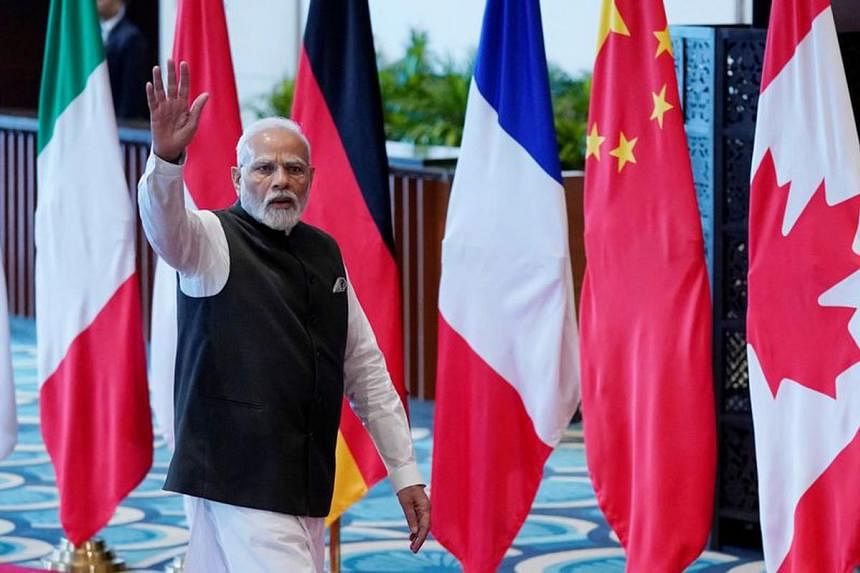NEW DELHI - Indian Prime Minister Narendra Modi urged leaders of the world’s 20 big economies on Nov 22 to do whatever necessary to ensure the Israel-Hamas conflict does not expand into a wider conflict as insecurity and instability in West Asia is worrying.
He was speaking at the opening of a virtual summit of Group of 20 (G-20) nations, of which India holds the presidency before Brazil takes over in December.
Mr Modi hosted the summit to review progress on policy suggestions and goals announced at the annual G-20 summit organised in New Delhi in September, and to determine how to speed up progress towards objectives.
That meeting was overshadowed by Russia’s war in Ukraine, although members overcame deep divisions over it to produce a consensus document and move forward on issues like overhauling institutions such as the World Bank.
The summit on Nov 22 was attended by Russian President Vladimir Putin, Chinese Premier Li Qiang, Japan’s Fumio Kishida, Turkey’s Tayyip Erdogan, Canada’s Justin Trudeau, Australia’s Anthony Albanese and Brazil’s Luiz Inacio Lula da Silva, among others.
Mr Modi’s comments on the Israel-Hamas war came as the two sides agreed to a ceasefire in Gaza for at least four days, to let in aid and release at least 50 hostages captured by militants in exchange for at least 150 Palestinians jailed in Israel.
Mr Modi told G-20 leaders that “new challenges have emerged” for the world in the past few months.
“The situation of insecurity and instability in the West Asian region is a matter of concern for all of us,” Mr Modi said. “It is necessary to ensure that the Israel-Hamas conflict does not become any form of a regional conflict.
“We believe that terrorism is unacceptable to all of us,” he continued. “Deaths of civilians anywhere is condemnable. It is important that humanitarian aid should reach in time and is uninterrupted.”
India has developed close strategic ties with Israel since the 1990s, but also has longstanding relations with Arab countries that enable large imports of oil for its fast-growing economy.
New Delhi has sought to balance these ties in its position on the Israel-Hamas conflict.
India has also not blamed its old friend Russia for the Ukraine war, and stressed that conflict should be resolved through dialogue and diplomacy.
The Kremlin said on Monday that Mr Putin would set out Russia’s view of what it sees as the “deeply unstable world situation” when he addresses the virtual G-20 summit.
Russian state TV presenter Pavel Zarubin said this would be the “first event in a long time” that includes both Putin and leaders in the West, which has imposed heavy sanctions on Russia over its invasion of Ukraine. REUTERS

